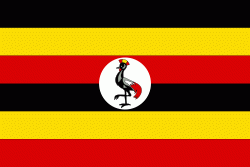Lira (Lira Municipality)
Lira is the name of several currency units. It is the current currency of Turkey and also the local name of the currencies of Lebanon and of Syria. It is also the name of several former currencies, including those of Italy, Malta and Israel. The term originates from the value of a Roman pound (libra, about 329g, 10.58 troy ounces) of high purity silver. The libra was the basis of the monetary system of the Roman Empire. When Europe resumed a monetary system, during the Carolingian Empire, the Roman system was adopted. The Roman denominations librae, solidi, denarii were used (becoming known in England as £sd).
Particularly this system was kept during the Middle Ages and Modern Age in England, France, and Italy. In each of these countries the libra was translated into local language: pound in England, livre in France, lira in Italy. The Venetian lira was one of the currencies in use in Italy and due to the economic power of the Venetian Republic a popular currency in the Eastern Mediterranean trade.
During the 19th century, the Ottoman Empire and the Eyalet of Egypt adopted the lira as their national currency, equivalent to 100 piasters or kuruş. When the Ottoman Empire collapsed in years 1918–1922, many among the successor states kept the lira as their national currency. In some countries, such as Cyprus, which have belonged to both the Ottoman Empire and the British Empire, the words lira and pound are used interchangeably.
For the Turkish lira, the Turkish lira sign is used. The Lebanese lira uses £L (before numerals) or L.L. (after numerals) in Latin and ل.ل. in Arabic. The Syrian lira uses £S (before numerals) or L.S. (after numerals) in Latin and ل.س in Arabic.
The Italian lira had no official sign, but the abbreviations L. and Lit. and the symbols ₤ (two bars), £ (one bar) were all commonly used.
The Maltese lira used £M before 1986 and Lm thereafter (both as prefixes), though £M continued to be used in unofficial capacities.
The Unicode system allocated to the Lira, to provide compatibility with a legacy HP character set. As with, where the one-bar and the two-bar versions are treated as allographs and the choice between them is merely stylistic, no evidence has been found that either style predominated in Italy or anywhere else.
Particularly this system was kept during the Middle Ages and Modern Age in England, France, and Italy. In each of these countries the libra was translated into local language: pound in England, livre in France, lira in Italy. The Venetian lira was one of the currencies in use in Italy and due to the economic power of the Venetian Republic a popular currency in the Eastern Mediterranean trade.
During the 19th century, the Ottoman Empire and the Eyalet of Egypt adopted the lira as their national currency, equivalent to 100 piasters or kuruş. When the Ottoman Empire collapsed in years 1918–1922, many among the successor states kept the lira as their national currency. In some countries, such as Cyprus, which have belonged to both the Ottoman Empire and the British Empire, the words lira and pound are used interchangeably.
For the Turkish lira, the Turkish lira sign is used. The Lebanese lira uses £L (before numerals) or L.L. (after numerals) in Latin and ل.ل. in Arabic. The Syrian lira uses £S (before numerals) or L.S. (after numerals) in Latin and ل.س in Arabic.
The Italian lira had no official sign, but the abbreviations L. and Lit. and the symbols ₤ (two bars), £ (one bar) were all commonly used.
The Maltese lira used £M before 1986 and Lm thereafter (both as prefixes), though £M continued to be used in unofficial capacities.
The Unicode system allocated to the Lira, to provide compatibility with a legacy HP character set. As with, where the one-bar and the two-bar versions are treated as allographs and the choice between them is merely stylistic, no evidence has been found that either style predominated in Italy or anywhere else.
Map - Lira (Lira Municipality)
Map
Country - Uganda
 |
|
| Flag of Uganda | |
Uganda is named after the Buganda kingdom, which encompasses a large portion of the south of the country, including the capital Kampala and whose language Luganda is widely spoken throughout the country. From 1894, the area was ruled as a protectorate by the United Kingdom, which established administrative law across the territory. Uganda gained independence from the UK on 9 October 1962. The period since then has been marked by violent conflicts, including an eight-year-long military dictatorship led by Idi Amin.
Currency / Language
| ISO | Currency | Symbol | Significant figures |
|---|---|---|---|
| UGX | Ugandan shilling | Sh | 0 |
| ISO | Language |
|---|---|
| AR | Arabic language |
| EN | English language |
| LG | Ganda language |
| SW | Swahili language |















